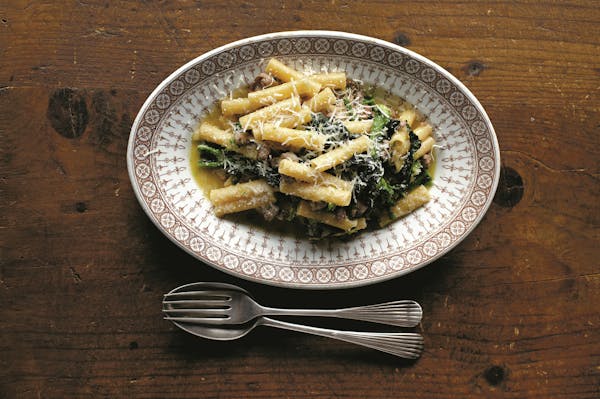With hair as red as a fox, and the warmth of a big cat, it makes sense that Lidia Bastianich equates dining with animal behavior.
"The table is a place to bond, where we sit together, where we receive food," she said. "It's almost an animal reaction. Your defenses are down, because you cannot eat when you're tense. That's why we have business lunches, why people propose over a meal. It's a place where we can let our vulnerabilities show. That's why the table is so special."
Bastianich was in St. Paul recently doing fundraising for TPT, Ch. 2, which airs her weekly cooking show, "Lidia's Italy in America." Her ninth cookbook, "Lidia's Favorite Recipes" (Knopf, $24.95), was released in October.
For her, cooking is a survival skill that everyone is capable of mastering — or at least improving upon.
"We need to eat to live, so everyone should feel ever more confident in how they cook," she said, before heading off to help cook a dinner for donors. "It's primal."
Still, she granted, in a world of food networks, bloggers, recipe websites and overstuffed cookbook shelves all promising mastery, even scrambled eggs may seem overwhelming.
"There are so many ways to be led, you have to be selective," she said. Delving into your own culture, you may realize that you possess sharper instincts than you thought, she said. "Food is a great retriever of memories. You might wonder, 'How did my mother make those scrambled eggs?' The flavors will lead you."
Even more, you will create memories.
"Have children grow up with the smells of food," she said. Then, be patient. A toddler who smells broccoli cooking may not want any, but that doesn't mean you shouldn't keep making it for yourself, because you're laying a foundation. "You cannot do this out of the blue — say, 'You're 4, so you're going to eat broccoli now.' But when you want them to try something, it will help if the smell is familiar."
In praise of seeds and beans
Bastianich champions eating foods in season, then preserving them "for lesser times." Little wonder that beans — legumes — are a passion. But she's also a cheerleader for seeds: sesame seeds, poppy seeds — "what we think of as decoration, but they're full of nutrition, because they contain the nutrients that start a whole plant."
Her family immigrated from Italy when she was 12, and she began working in restaurants and bakeries when she was 14. Today, her cooking empire includes her children. Bastianich, who turns 66 this month, just returned from a trip to Antarctica, where, she said, she felt "closer to God."
Still, her greatest sanctuary is the kitchen. She talks about food almost viscerally, reaching for her shoulder while extolling the virtues of flatiron steak, cut from that portion of the steer, then patting her hip when she acknowledges that "some people like the sirloin."
While she contends that food is evolving more slowly "than TV would have us believe," she's happy to see more men moving into the kitchen, although not for the reasons you may think.
"I think it's a place where they can share emotions in a way that they're comfortable with," she said. "They don't have to hug someone, or tell them they love them, but they can cook for them."
Cooking tips from Lidia
• "I toast tomato paste. Indians do that to spices. It brings forth big flavors. I try to do that every step of the way."
• "I like garlic in slices or crushed. I cook garlic first in the hot spot of the pan, and don't add vegetables to it right away because the humidity of the vegetables won't allow the garlic to toast."
• "You need to get the water out of the meat before adding any wine."
• "Use pasta water for sauce. Some people think you need to use stock, and you certainly can. But for simplicity, I use pasta water. Cook some onion and bacon, add a little pasta water and cook it down. If you're holding dinner because someone is late, you can add a little more pasta water as you need it. With a dish like ziti with onions, sausage and fennel slices, add a little tomato paste to a little pasta water and you have an instant sauce."
• "If you streamline a cooking technique, then you need to add condiments. For soup, add dried porcini for a deeper taste. You need to add ingredients with intensity."
Kim Ode • 612-673-7185 @Odewrites
Minneapolis will bid to host Sundance Film Festival

Icehouse on Eat Street in Mpls. facing eviction for unpaid rent

Ashley Judd and Aloe Blacc help the White House unveil its national suicide prevention strategy
Get better sleep with these 5 tips from experts

